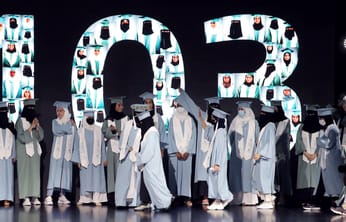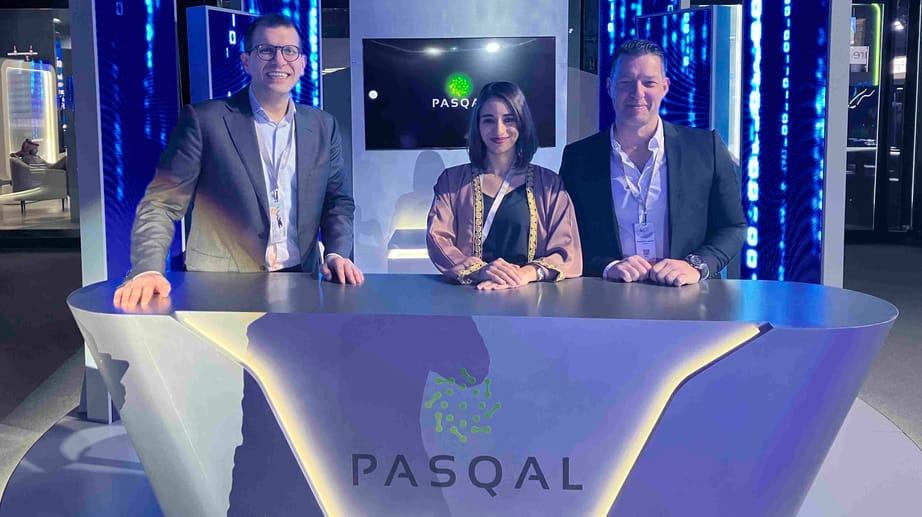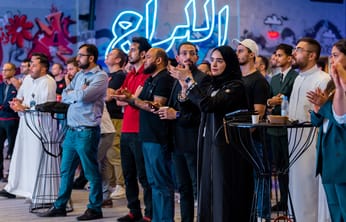
Leading The Charge
With education, mentorship, collaborations, and more, here’s how Saudi Arabia is attempting to close the gender gap in AI

Saudi Arabia’s journey may be in the early stages, but the Kingdom is charting its course towards technological revolution
By Devina Divecha
Technological advancements are an integral part of Saudi Arabia’s ambitious Vision 2030, which aims to diversify away from oil into multiple industries and sectors. While technology like artificial intelligence (AI) are perhaps more in the news, it’s the field of quantum computing that is slowly making its way known beyond the cognoscenti.
However, what is quantum computing anyway? Let’s start with an understanding of the tech. Cognovation is a company that offers specialized advice on quantum technologies to the public and private sector in Saudi Arabia, and according to its founder Dr. Mazhar Ali Bari, quantum computing represents a paradigm shift in computing, which is distinct from classical computing based on binary systems of zeros and ones.
“Quantum technologies, in general, are based on quantum physics, which was discovered at the beginning of the 20th century,” he explains. “Today’s computers are also somewhat based on quantum physics. A qubit [the quantum version of the binary bit], however, is very different from a bit. A bit is only two things- one and zero, where something is either in one state or the other. Now, imagine you could be one or zero, or millions of values in between one and zero as well. That opens up a huge computational opportunity. Imagine if you have a very complex maze- if you use conventional computers, you have to try each method sequentially to find the best route. In a quantum computer, you would look at all the routes simultaneously, at the same time.”
While the concept of quantum computing was proposed decades ago by American theoretical physicist Richard Feynman, recent advancements have propelled this theoretical idea into reality. Companies like Google, IBM, and others are at the forefront of quantum computing research, albeit in its nascent stages. “We are dealing with an emerging technology, and we don’t know how long until they are powerful enough to do the things we expect them to do,” Dr. Bari says. “But it’s becoming more and more promising. And if it works, it’s going to be absolutely revolutionary; it may be like a new industrial revolution. It could be a quantum age.”
So, where does Saudi Arabia lie in the lay of the quantum computing land? Despite being in its early stages, quantum computing in the Kingdom is gaining momentum, and Parminder Kaur, Director of Growth Advisory, Security Practice at Frost & Sullivan, has examples to cite. “King Abdullah University of Science and Technology (KAUST) partnered with Zapata Computing to bring quantum computing to Saudi Arabia,” Kaur notes. “KAUST is also dedicated to enhancing research in computational fluid dynamics (CFD) by harnessing quantum technology, particularly investigating the potential of quantum computers to enhance the aerodynamic design of vehicles.” Announced in 2021, this move will significantly impact the aerospace, automobile and other industries by enhancing CFD, she adds. “In March 2022, Saudi Aramco partnered with PASQAL, a Francebased quantum technology provider, to develop quantum computing solutions for the energy sector,” Kaur continues. And following that, in January 2023, Aramco’s Wa’ed Ventures also invested in PASQAL in the latter’s US$108 million Series B round.
According to Christophe Legrand, Senior Vice President for Global Sales at PASQAL, Saudi Arabia is the portrait of a landscape brimming with potential. “The field of quantum computing and its research and development is progressing rapidly, and attracting significant attention from academia and major industrial and academic groups from the Kingdom,” he says. “There have been notable advancements in the development of quantum hardware in increasing the qubit count, improving qubit coherence time, and enhancing error correction techniques. On the algorithm improvement, researchers continue to refine quantum algorithms and explore their potential applications across various domains including optimization, material science, drug discovery and machine learning.”
All of this is, of course, aligned with the ambitious goals of Vision 2030, including addressing key objectives. “The Saudi Arabia Vision 2030 includes several initiatives and projects on digitalization such as the Digital Saudi 2030 Strategy and National Transformation Program,” Frost & Sullivan’s Kaur notes. “The progress of quantum computing in the nation aligns with several crucial aspects of Vision 2030, such as fostering a flourishing digital economy, enhancing cybersecurity, promoting talent development, and fostering innovation. The Saudi Data and Artificial Intelligence Authority (SDAIA) is also actively working on initiatives that will fund education and research programs. The Kingdom is drawing in international talent and establishing research centers to propel advancements in the field of quantum computing.”
Dr. Bari says now is the crucial time for a strategic approach encompassing materials, devices, software, and use cases. While most other G20 countries, for example, already have officially announced their national quantum strategies, Saudi Arabia still must work its way to that stage. “Awareness among key stakeholders is definitely growing, and bringing a national quantum strategy on its way sooner rather than later would be a logical undertaking,” Dr. Bari says. In such a scenario, the potential of what quantum computing can do across sectors is important. For instance, with Saudi Arabia’s Vision 2030 in sight, PASQAL’s technology holds promise in key sectors such as energy, aerospace, defense, and technology.
“The potential is huge,” Legrand declares. “The Middle East region -and Saudi Arabia in particular- love new technologies, and quantum technology has the particularity of being able to be integrated into a project such as Saudi Vision 2030. Today, we’re delivering computers that can offer several advantages, such as low energy consumption, which we see as an incredible lever and particularly interesting for the region.”Plus, with Wa’ed’s investment into PASQAL, Legrand sees a lot of opportunity for growth. “We’re already very proud to be part of this Aramco family,” he adds. “The support that Wa’ed gives us is incredible, and it enables us to multiply our forces in the Kingdom. Saudi Arabia and the Middle East are now part of our strategic development axes. We have opened an office and hired Saudi nationals, and we’re working hard to integrate into the In Kingdom Total Value Add program.” (Here, Legrand is referring to Aramco’s In Kingdom Total Value Add program, which was launched to baseline, measure and support increased levels of localization in the Kingdom; this is now a crucial element of contracting with the Saudi oil giant.)
But Aramco isn’t the only entity PASQAL is associating itself with in Saudi Arabia. “We’re already working closely with Aramco, but we’ve also launched several other initiatives with other industries, such as telco and finance,” Legrand shares. “I can’t give you too many details here for confidentiality reasons, but you can imagine that we can work on subjects linked to reservoir simulation or complex optimization issues. What’s important for us is to be able to identify use cases that can be executed on real quantum machines and not simply on emulators like most of our competitors. Our main priority for Saudi Arabia will focus our effort on three main verticals: energy, aerospace and defense, tech and telco.”
Now, while there’s a lot to be explored in this field, Dr. Bari does caution about the challenges in the move towards quantum supremacy. In their current state, he says, quantum computers can be noisy, necessitating advancements in hardware and algorithms. “There are very few areas currently with the current hardware which show quantum advantage,” he explains. “So, in other words, where is quantum computing better than classical computing? When that’s achieved, that will be called the quantum advantage, and in order to get there, we have to produce better hardware than we are now.”
As the hardware is not mature yet and is subject to large R&D investment, a report titled How Can Saudi Arabia Join The Quantum Computing Race? by Arthur D. Little commissioned by the Ministry of Communications and Information Technology (MCIT) suggested that the Kingdom should instead “focus on quantum computingas- a-service (QCaaS) opportunities and prioritize development of QC software and services capabilities.” Additionally, the shortage of skilled professionals and the absence of the right education infrastructure pose hurdles to quantum progress.
Dr. Bari, who holds a PhD in Quantum Physics from the University of Cambridge, UK, agrees. “You need to have people, you need to have the workforce, the software, the engineers, the scientists, and the researchers,” he says, highlighting the importance of workforce training and development. He also urges further investments in physics education to cultivate the talent pool needed for the development of this technology. “The workforce training and development is key,” he declares. “I grew up in Ireland, Dublin, and every major university has a physics department. Saudi Arabia has some very good universities with a lot of engineering and computer science departments, but they need to invest more in their physics education infrastructure.”
The technology of quantum computing also presents a paradigm shift in cybersecurity– it can offer enhanced security through quantum-safe cryptography, but it also presents threats to existing encryption methods. “Quantum computing has the potential to revolutionize the field of cybersecurity, as it presents several opportunities for more secure communication through quantum-safe cryptography and quantum key distribution,” Frost & Sullivan’s Kaur explains. “However, it also poses a significant threat to existing encryption methods, such as breaking current encryption algorithms, limiting key generation rate and transmission distance, compromising blockchain and cryptocurrencies, processing limitations, and breaking authentication. Preparing for this quantum era is crucial for data protection, because of the potential threat that quantum computing poses to existing cryptographic and encryption systems. Quantum computing has the potential to disrupt widely employed cryptographic algorithms that presently safeguard our digital communication and data.”
Dr. Bari agrees with this notion, and adds the term “post-quantum cryptography” (PQC) to the mix. “Quantum computers, in theory, can break any of the known current encryption keys,” he notes. “Essentially, everything is hackable if you have a quantum computer today, and that poses a big risk. Countries like the USA are taking the lead in this area, and they are developing postquantum encryption algorithms or techniques to make existing technology quantum safe.” Nevertheless, opportunities abound. It really is a whole new world, and Legrand says, “Saudi Arabia is a pioneer in this field. Our aim is to support and accelerate this development by installing PASQAL machines in the Kingdom, and to give the entire ecosystem access to this incredible, but also very rare, technology. So, we’re very much looking forward to bringing all this to reality as quickly as possible, and making this new technological revolution even more tangible.”
Beyond quantum computing, Cognovation’s Dr Bari highlighted the significance of further quantum technologies. “Quantum computing is only one part of quantum technologies,” he says. “There is quantum sensing, quantum communications, quantum hardware and software, and quantum services and end users.” While all are of interest, Dr Bari especially highlights the potential of quantum communications. “This is a very interesting area within quantum (communications) technologies: people are talking about the concept called the quantum internet,” he explains. “In the future, we may have something called quantum internet where you can transmit information that’s so safe and unbreakable, nobody can hack into it.” Dr. Bari says experiments on this front have been carried out across the world, and adds, “Quantum communication is going to be very important, because if you can transmit information that cannot be broken, that’s revolutionary.”
To sum it up, exciting times certainly seem to be in the offing in this space. “Once the technology is mature, it will impact every industry,” Dr. Bari concludes. “The challenge right now is to find the first early adopters of the first use cases, which really demonstrates superior performance in terms of economic value. And I always like to joke that –and maybe it’s not a joke, really– that he who controls quantum controls the world.”
Discover the most outstanding articles.اكتشف أبرز المقالات.

Harnessing the power of digital twins to reimagine cities across the KSA and beyond. According to PwC’s 2022 report,

How Riyadh-based The Garage is contributing to a flourishing startup culture in Saudi Arabia In the heart of Riyadh, nestled

Saudi astronauts Rayyanah Barnawi and Ali Alqarni make history in giant leap for the kingdom. From earthbound dreamers to cosmic